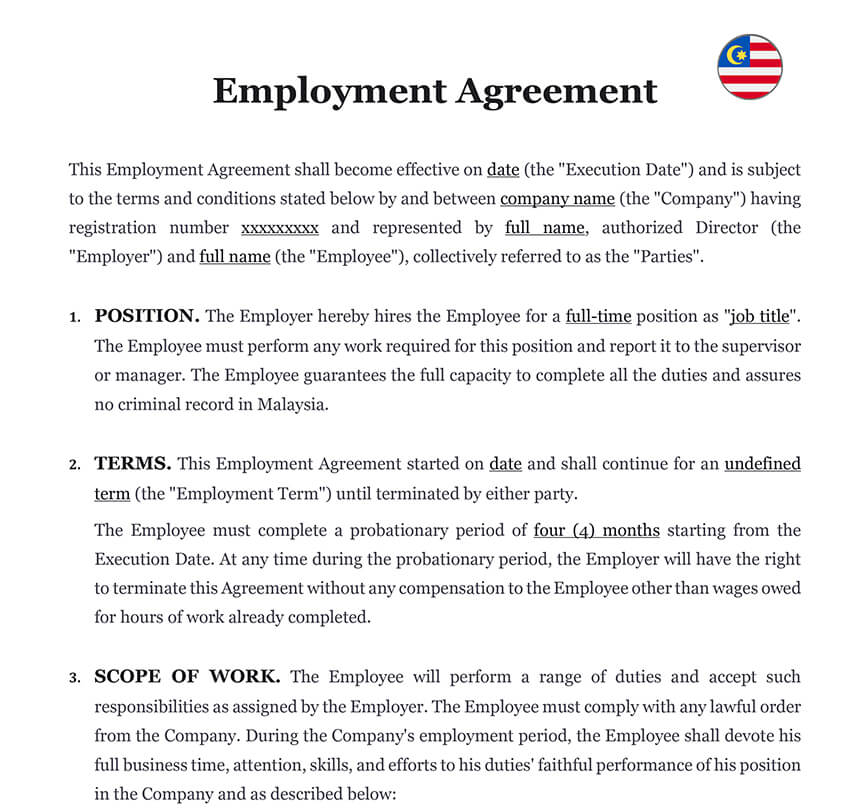Ready to use legal template
Drafted by experienced lawyers
Compliant with Malaysian law
Ready to use legal template
Drafted by lawyers
Compliant with Malaysian law
Learn more about Employment Contract in Malaysia
An Employment Contract is a legally binding agreement between an employer and an employee that defines the terms and conditions of employment. It outlines key details such as job responsibilities, salary, working hours, benefits, termination clauses, and confidentiality obligations. In Malaysia, employment contracts must comply with the Employment Act 1955, ensuring fair treatment and legal protection for both parties. Having a well-drafted Employment Contract is essential for preventing disputes and ensuring both employer and employee understand their rights and obligations. Whether hiring full-time, part-time, or contract employees, a written agreement is critical to comply with Malaysian labor laws. Download our expert-drafted Employment Contract, fully editable in Word format, tailored for employment in Malaysia.
Table of contents
What is an Employment Contract?
An employment contract is a written agreement between an employee and his or her employer or labor organization. It specifies the rights and duties of both the employee and the corporation.
Any sort of employment that lasts more than one month in Malaysia must be formalized by a written contract. The key conditions of the employment connection, such as work location, scope, wage rates, wage period, vacations, benefits, and health and safety issues, should be specified in this contract. All labor contracts in Malaysia are governed by the Employment Act 1955, which states that employees’ right to participate in or join trade unions cannot be curtailed. Employers must also keep these contracts for six years after they expire.
What is included in the Employment Contract?
The contract must incorporate key conditions of the work relationship, such as:
| ➤ Job description |
| ➤ Location of employment |
| ➤ Wage scale |
| ➤ Pay period |
| ➤ Employment benefits |
| ➤ Vacation, yearly, and sick leave |
| ➤ Concerns about preserving health and safety |
Are there different types of Employment Contract?
There are full-time contracts, part-time contracts, casual (freelance), fixed-term contracts, traineeships with a probationary period, and piecework contracts (commission-only payment). Employees on full-time contracts work on a weekly basis (full week), whereas part-time workers are expected to work on a regular ongoing basis rather than a full week.
Casual employees, often known as freelancers, work on a project-by-project basis, as needed. They might agree with the employer to work a fixed number of hours and can decline the job offer. When an employee is engaged on a fixed-term contract, he or she is typically hired for a specific project or simply to replace another worker for a set length of time.
Trainees are individuals employed for a specific job in which they must perform practical work (for the purpose of learning new skills) without compensation from the company for which they work. Their compensation rates are often covered by an agreement or an award.
Contracts with a probationary term are written so that a business owner can be confident that the new employee is qualified for the position.
What are the main clauses of an Employment Contract?
Employment Situation
An employment contract is required since it specifies the rights, obligations, and duties of both the employee and the employer.
Scope of Employment
The scope of the work often comprises the job title, reporting supervisor, job description, and key performance indicators.
Compensations
Salary, allowances, employee share option plans or equity awards, fringe benefits, and other benefits are all part of the remuneration package.
Benefits
Annual leave, sick and hospitalization leave, and maternity leave are all covered in the benefits section. Some leaves that are not required by the Employment Act of 1955, such as compassionate leave, dental and optical allowances, and paternity leave, can also be included.
Maintaining Confidentiality
This provision is critical if an employee needs access to sensitive information. The confidentiality clause shields employers from the misuse of confidential information that could harm the organization.
Intellectual property rights
The Intellectual Property provision is especially important if the employee is engaged to develop intellectual property for the company, such as a designer or inventor. An intellectual property clause assures that such rights are owned by the employer’s company.
Termination
Termination clauses are required to oversee each party’s obligations after the agreement expires. Before firing an employee, an employer must provide reasonable cause and an explanation.
What are the Malaysian regulations?
1. Rights
Section 7 of the Employment Act of 1955 states that if the terms and conditions of an employment agreement do not comply with the EA’s provisions, the contract is null and void. Even if both the employer and the employee agreed and signed the employment contract freely, any conditions that do not comply with the rules will be replaced by those stipulated by the Employment Act.
2. Wage payout schedule
According to Section 19(1) of the Employment Act of 1955, all employers are required to pay each of their employees no later than the seventh day following the last day of any wage period, which is deemed to be one month if no wage period is defined in the contract (Section 18(2) of the Employment Act). Wages for work done on a rest day, gazetted public holiday, or overtime must be paid no later than the last day of the next month, according to Section 19(2).
3. Working times
According to Section 60A (1) of the Employment Act of 1955, an employee is not compelled by their service contract to work:
| ➤ Over 5 hours in a row without a break of less than 30 minutes |
| ➤ In excess of a total of 10 hours per day |
| ➤ More than 8 hours each day |
| ➤ More than 48 hours per week |
Can Malaysian companies hire foreigners?
Companies that hire foreigners must acquire foreign quota approval from the Ministry of Home Affairs’ Local Centre of Approval. Foreign workers are permitted to work for Malaysian enterprises in agriculture, construction, manufacturing, plantation, and services.
Employers should be aware that only specific roles are open to foreigners, which are typically highly skilled or technical professions that cannot be filled by locals. The employer must submit to the Immigration Department the employment permit application as well as a letter explaining why the post must be filled by a foreigner. A letter of approval for the employment pass will be issued once it has been authorized.
How to terminate an Employment Contract?
Section 12 of the Employment Act of 1955 states that either the employer or the employee may give notice to the other party of their intention to terminate the service contract.
The notice length shall be:
| ➤ 4 weeks: Employed less than 2 years |
| ➤ 6 weeks: Employed between 2 to 5 years |
| ➤ 8 weeks: Employer longer than 5 years |
SPECIAL OFFER
HR Pro
15 Document Package
Essential documents for managing employees in Malaysia
Employment AgreementTemplate (.docx)
Save on attorney fees
310 client reviews (4.8/5) ⭐⭐⭐⭐⭐
Share information
Why Themis Partner ?
Make documents forhundreds of purposes
Hundreds of documents
Instant access to our entire library of documents for Malaysia.
24/7 legal support
Free legal advice from our network of qualified lawyers.
Easily customized
Editable Word documents, unlimited revisions and copies.
Legal and Reliable
Documents written by lawyers that you can use with confidence.




